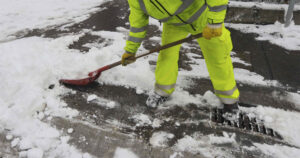Safety Tips for Shoveling Snow
February 1, 2024 According to weather forecasters, Philadelphia residents should expect about 75 times more snow this winter than we saw last year. This probably comes as no surprise since the tristate area has already seen significant snowfall so far. Before another storm hits, let’s learn about how shoveling snow may carry heightened risks for experiencing a cardiac event – and what steps you can take to limit known dangers.
According to weather forecasters, Philadelphia residents should expect about 75 times more snow this winter than we saw last year. This probably comes as no surprise since the tristate area has already seen significant snowfall so far. Before another storm hits, let’s learn about how shoveling snow may carry heightened risks for experiencing a cardiac event – and what steps you can take to limit known dangers.
The National Safety Council (NSC) reports that thousands of people sustain snow shoveling-related injuries annually; additionally, hundreds die during or just after removing snow. Because of the often-hidden dangers of shoveling snow, the American Heart Association (AHA) is reminding Americans just how much of a strain it can put on someone’s heart – especially for individuals who are not accustomed to regular, daily exercise. Studies conducted by some of America and Canada’s leading experts on the cardiovascular risks of snow shoveling have found:
- The strain of heavy snow shoveling may be as or even more demanding on a person’s heart than taking a treadmill stress test
- Only two minutes after snow shoveling, the heart rates of participants in a study exceeded 85% of maximal heart rate, which is a level commonly experienced during intense aerobic exercise. The impact of this heart rate is the hardest on people who are the least fit
- A heavy snow (7-8 inches or more) is associated with as much as a 16% increased chance for men being admitted to a hospital for heart attack and a 34% increase in the chance of men dying from heart attack
It is not just the exercise component of shoveling snow that can make it dangerous. Cold weather also creates its own, unique risks. Cold temperatures can increase blood pressure at the same time as constricting the coronary arteries. Combining these two factors with the increased heart rate that goes along with physical effort (shoveling snow), says the AHA, may increase the risk for an acute cardiac event.
The cardiac risks associated with snow removal are even more problematic for individuals with preexisting cardiovascular risk factors like obesity, high blood pressure, smoking (former or current), poor diet, a sedentary lifestyle, and people who have had a heart attack or stroke. The AHA says that individuals with cardiac risk factors and those who have had a bypass surgery or coronary angioplasty should avoid shoveling snow. Even those without known risk factors need to be cautious.
Here are some key safety tips and information to be aware of:
- Before undergoing any physical activity, learn the common signs of heart trouble. If you begin to experience chest pain or pressure, lightheadedness, heart palpitations or irregular heart rhythms, stop the activity immediately. Call 9-1-1 if your symptoms do not subside shortly after you stop snow shoveling
- Stretch before shoveling snow
- Take it easy when you are shoveling. This means lifting with your legs and not your back, going slowly, taking frequent breaks, pushing snow instead of lifting it with the shovel, etc.
- Stop shoveling if you are feeling tired or exhausted
If you have questions or concerns about a snow-related injury you sustained, someone at our firm can help. To learn more, contact a representative online now.
Philadelphia Personal Injury Lawyers at Galfand Berger, LLP, Representing Injured Victims Since 1947
If you have questions about filing a claim for injuries you sustained, contact the Philadelphia personal injury attorneys at Galfand Berger LLP today. Call us at 800-222-USWA (8792) or fill out our online form for a free consultation. Located in Philadelphia, Bethlehem, Lancaster, and Reading, we serve clients throughout New Jersey and Pennsylvania, including Allentown and Harrisburg.
 Google Screened
Google Screened
